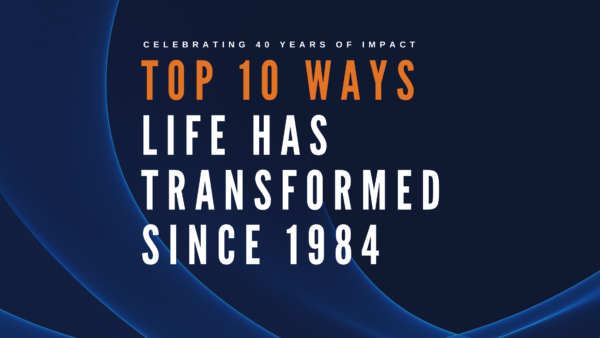Celebrating 40 Years of Impact: 10 Ways Life Has Transformed Since 1984
February 19th, 2024

As we commemorate our 40th anniversary, it’s an opportune moment to reflect on the incredible transformations our world has undergone since Cunningham-Limp’s inception in 1984. From technological advancements to shifts in social norms, the past four decades have shaped our lives in ways we could scarcely have imagined. Let’s take a captivating journey through time and explore the top 10 ways life has changed since 1984.
- The Digital Revolution: In 1984, personal computers were just emerging, and the internet was a distant dream. Fast forward to today, and we’re living in a digital age where smartphones are ubiquitous and connectivity is seamless.
- Globalization: The world has become more interconnected than ever before. Globalization has facilitated the exchange of goods, ideas, and cultures on a scale previously unimaginable, transforming the way we do business and perceive the world.
- Social Media: Platforms like Facebook, X (formerly “Twitter”), and Instagram have revolutionized communication, enabling instant connection and interaction across the globe. Social media has fundamentally altered how we socialize, consume information, and even participate in activism.
- Medical Advancements: From groundbreaking treatments for diseases like HIV/AIDS to the development of life-saving vaccines, medical science has made tremendous strides since 1984, improving healthcare outcomes and extending life expectancy.
- Environmental Awareness: The environmental movement has gained significant momentum, with growing concerns about climate change and sustainability. Efforts to combat environmental degradation have led to widespread awareness and initiatives aimed at preserving our planet for future generations. Check out our JST project, the most environmentally sustainable project in Michigan, to see how environmental awareness can be incorporated into the construction and development industry.
- Transformations in Construction: Advancements in materials science have revolutionized the way buildings are designed and constructed. From high-performance, eco-friendly materials to innovative construction techniques such as 3D printing and modular construction, the industry has embraced new technologies to meet the growing demands for safer, more resilient, and energy-efficient structures. Additionally, a heightened emphasis on safety and regulatory compliance has led to the development of sophisticated monitoring systems and wearable technologies that enhance worker safety and productivity on construction sites.
- Technological Innovation: From the rise of artificial intelligence and machine learning to the advent of renewable energy technologies, technological innovation has reshaped industries, economies, and everyday life, fueling progress and innovation.
- Cultural Diversity: Our society has become increasingly diverse, embracing and celebrating different cultures, ethnicities, and perspectives. This cultural mosaic enriches our communities and fosters greater understanding and empathy among people from all walks of life.
- Workplace Dynamics: The nature of work has evolved dramatically, with remote work becoming more prevalent and flexible arrangements reshaping traditional office dynamics. Automation and digitization have also altered job roles and skill requirements, prompting a shift toward lifelong learning and adaptability.
- Changing Demographics: Demographic trends have shifted over the past four decades, with aging populations, urbanization, and migration patterns influencing societal structures and policies. These demographic shifts pose both challenges and opportunities for governments, businesses, and communities worldwide.
As we celebrate our 40th anniversary, let’s embrace the spirit of innovation, adaptability, and community impact that has defined our journey thus far. Together, we look forward to navigating the ever-changing landscape of the future with optimism and determination.
Here’s to the next 40 years of #BuildingBetterCommunities.

